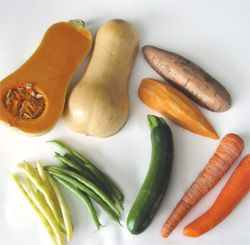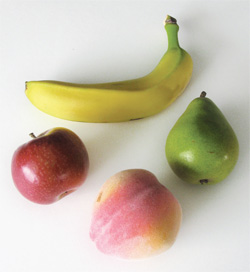Vegetables and fruit

![]() Once your baby is eating iron-rich foods every day, you can add fruits and vegetables to her diet.
Once your baby is eating iron-rich foods every day, you can add fruits and vegetables to her diet.
Vegetables and fruit are vital for good health. Not only do they add a wide variety of flavours to your baby’s diet, they also provide minerals and vitamins like vitamin C. They are rich in fibre, too, which helps your baby have regular bowel movements.
After a certain time, you can make fruits and vegetables part of every meal. For example you can serve vegetables at lunch and supper, and give your baby fruit at breakfast and for dessert. Fruits and vegetables also make good snacks.
Vegetables

![]() Give your child a variety of vegetables.
Give your child a variety of vegetables.
Give your baby a variety of vegetables. Their colour indicates what kind of nutrients they contain. That’s why experts recommend adding fruits and vegetables of all different colours to your baby’s diet. For example, try vegetables that are orange (e.g., carrots, squash, sweet potatoes) or dark green (e.g., broccoli, peas, green beans, bell pepper, okra).
You can serve frozen or canned vegetables, but make sure they don’t contain salt, sauce, or seasoning. You can rely on the ingredients listed on the label. Frozen vegetables must be cooked first.
Fruit

![]() Give your child a variety of fruits.
Give your child a variety of fruits.
Give your child a variety of fruits. You can use fresh or frozen fruit. Commercial canned fruit and compotes are also convenient. Choose brands without added sugar and don’t add sugar if you prepare fruit.
How to prepare fruit
Berries like strawberries, raspberries, blueberries and blackberries can also be mashed with a fork or cut into small pieces.
Later, you can serve your baby firmer fruits like melon, plums, or cherries cut into small pieces. You can also give your child grapes cut into quarters, small pieces of orange, grapefruit, or clementine, and grated or lightly cooked apples.
What about fruit juice?
![]() Fruit juice is not essential. To quench your child’s thirst between feedings, water is the best choice.
Fruit juice is not essential. To quench your child’s thirst between feedings, water is the best choice.
To quench your child’s thirst between feedings, water is the best choice. In fact, fruit juice is not essential. Unlike fruit, it doesn’t contain fibre and is not as nutritious.
Good to know...
Fruit juice has a number of disadvantages:
- It increases the risk of early childhood tooth decay, since it naturally contains sugar.
- There is a risk of it replacing milk and foods essential to your child’s health and development if given in too great a quantity.
- It can spoil your child’s appetite if served within an hour of mealtime.
- It can cause diarrhea if it is served in too great a quantity.
If you give your child fruit juice...
![]() Avoid giving your child unpasteurized juices.
Avoid giving your child unpasteurized juices.
Here are a few helpful tips:
- Wait until your child is at least 1 year old and limit the quantity of juice to a maximum of 125 to 175 ml (4 to 6 oz) per day.
- Never serve juice in a baby bottle.
- Don’t let your child drink juice for prolonged periods. This will help protect her teeth.
- Serve juice no more than once or twice a day.
Choose pasteurized, 100% pure fruit juice with no added sugar. There’s no need to buy special juice for babies, since it’s the same as regular juice only more expensive. Avoid fruit drinks, cocktails and punches, as well as fruit-flavoured powders—they have little nutritional value and are made with sugar.
Avoid unpasteurized juice. Freshly squeezed juice bought directly from the producer is not pasteurized. Certain chilled juices sold in the grocery store are not pasteurized either. They may contain harmful bacteria. Young children are very sensitive to these bacteria
Does your child like juice too much? See Sugar.
Nutrients: Components of food, including vitamins, minerals, proteins, sugars, and fats.


